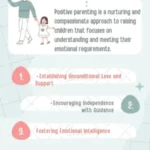Building resilience in kids is a fundamental aspect of their development, equipping them with the tools to thrive amidst adversity. Resilience is not an innate trait but a skill that can be cultivated through effective positive parenting techniques. In this article, we will explore the significance of resilience, its profound impact on children’s lives, and delve into powerful positive parenting solutions that foster resilience in kids.
Understanding Resilience: An Enduring Skill
Resilience is not a mere quality but an essential skill that allows children to navigate life’s trials and tribulations with courage and optimism. Unlike a fixed characteristic, resilience can be nurtured and fortified through supportive environments and constructive experiences. Resilient children perceive challenges as opportunities for growth and development, and mistakes as stepping stones on the path to success. Central to resilience are coping skills, emotional intelligence, and a positive outlook that empowers children to confront life’s uncertainties with unwavering confidence.
The Impact of Resilience on Children’s Lives
Emotional Well-being:
Resilient children possess a deeper sense of emotional well-being. They are adept at recognizing and expressing their feelings in healthy ways, leading to reduced stress and anxiety levels. Emotional resilience enables them to cope with difficult emotions and emerge stronger from challenging situations.
Problem-Solving Skills:
Resilience fosters robust problem-solving abilities in children. They learn to analyze situations critically, devise innovative solutions, and adapt to changing circumstances with resourcefulness. These problem-solving skills become invaluable assets as they encounter diverse challenges throughout life.
Read also: From Stress to Success: The Benefits of a Parenting Class
Self-Esteem and Confidence:
When children overcome obstacles, their self-esteem and confidence soar. The belief in their own abilities empowers them to take on new challenges with determination and tenacity. Resilience instills a growth mindset that celebrates effort and perseverance over innate talent.
Positive Relationships:
Resilience enhances a child’s capacity to build positive relationships. Empathy and effective communication skills are nurtured, leading to deeper connections with peers and adults. These strong social bonds act as a support network during challenging times.
Academic Success:
Resilience positively impacts academic performance. Children who rebound from academic setbacks are more likely to persevere and excel in their studies. They view challenges as opportunities for learning and personal growth, fostering a love for continuous learning.
Positive Parenting for Cultivating Resilience
Create a Nurturing Environment:
Foster a home environment that promotes open communication and unconditional love. Be emotionally available for your child and encourage them to share their thoughts and emotions without fear of judgment. A nurturing environment builds trust and resilience.
Teach Problem-Solving Skills:
Engage your child in age-appropriate decision-making processes to develop their problem-solving skills. Encourage them to brainstorm solutions and evaluate potential outcomes. This empowers them to confront challenges with confidence.
Cultivate a Growth Mindset:
Instill a growth mindset in your child by praising effort and persistence over innate talent. Teach them that failures are natural steps on the journey of learning and self-improvement. A growth mindset fosters resilience and a willingness to embrace challenges.
Model Resilience:
Be a positive role model by demonstrating resilience in your own life. Share stories of how you overcame obstacles, emphasizing the valuable lessons learned from each experience. Children learn by example, and your resilience will inspire theirs.
Foster Emotional Intelligence:
Help your child identify and understand their emotions. Encourage them to express their feelings constructively, such as through journaling or engaging in artistic activities. Emotional intelligence equips children to manage emotions effectively.
Encourage Healthy Risk-Taking:
Support your child in taking safe and calculated risks, such as trying new activities or expressing themselves creatively. This builds their confidence and courage, essential qualities for facing life’s challenges.
Establish Routines and Structure:
Provide a sense of stability and predictability through daily routines. Consistent routines create a safe space for children to explore and take measured risks outside their comfort zones.
Promote Autonomy and Independence:
Allow your child to take on age-appropriate responsibilities and make decisions. This fosters a sense of competence and self-reliance, essential attributes for building resilience.
Teach Coping Strategies:
Equip your child with healthy coping strategies to manage stress and anxiety. Teach them techniques like deep breathing exercises, mindfulness practices, or engaging in physical activities to regulate their emotions.
Celebrate Efforts and Progress:
Acknowledge your child’s efforts and progress, no matter how small. Celebrate their achievements and provide positive reinforcement to encourage further growth and perseverance.
Conclusion
Building resilience in kids is a transformative journey that lays the foundation for their future success and well-being. As parents, we play a vital role in cultivating this essential skill through powerful positive parenting methods. By creating a nurturing environment, teaching problem-solving skills, fostering a growth mindset, and exemplifying resilience in our own lives, we empower our children to navigate life’s challenges with courage, optimism, and determination.





